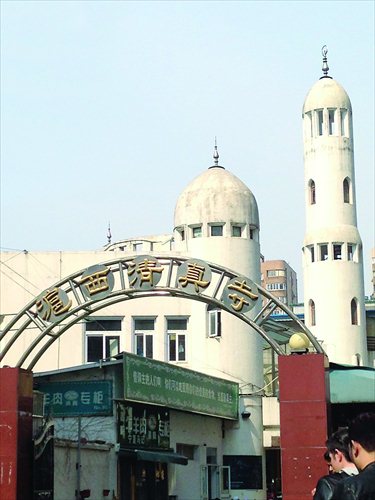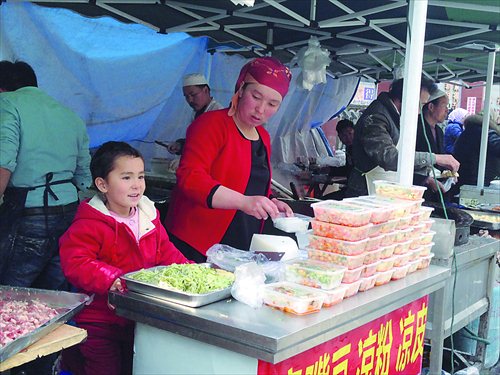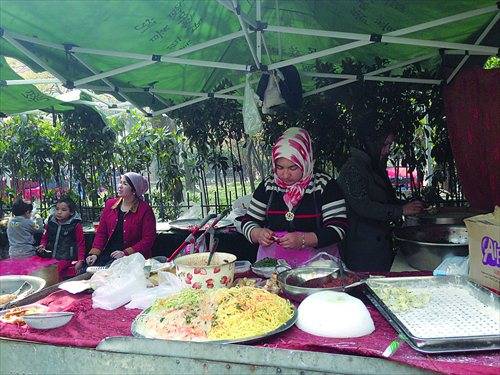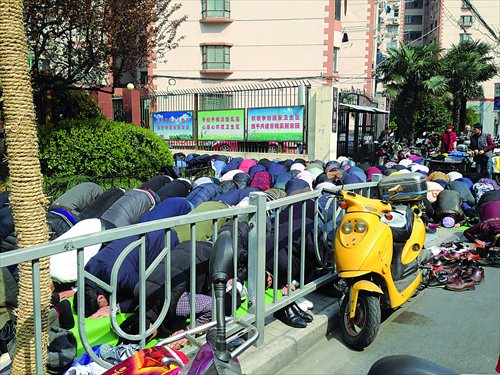Food for thought, and faithful
The history of Muslims in China comes alive in a weekly street fair at Huxi Mosque
Shanghai has always had a diverse community since opening to foreign trade in 1843.
Not only Europeans moved in, but also those from different cultural backgrounds and religions, such as Jews, Indians and Muslims. The latter, who began arriving in the late 18th century, had a comparatively easier time assimilating into local culture through domestic Muslim communities and facilities.
There have been 27 different mosques through the history of Shanghai, but only seven still exist. The earliest Chinese Muslim settlement was in today's Songjiang district, and they built their first mosque there in 1341 during the Yuan Dynasty (1279-1368).
In addition to these Shanghai locals, Muslim merchants, mostly from the Hui ethnic group, moved from different regions to Shanghai and concentrated on baking, jewelry and leather industries.
Except the Songjiang Mosque, with its intensive style of Chinese architecture, other mosques have few sign of traditional Chinese style.
One of the major mosques today is Huxi Mosque (picutred below), literally the West Shanghai Mosque. It dates back to 1914, when it was on Xikang Road, and today it sits on Changde Road.

Friday prayers at Huxi Mosque are a lively gathering, including a weekly festival with food carts selling various Muslim foods and hawkers selling traditional objects. This weekly event is noted even in tourist guides.
The food carts line both sides of Aomen Road, just behind the mosque. During prayer between 1:30 pm and 2 pm, the street is silent, with noticeably only Muslim women and tourists, as the boys and men are in the mosque.
But soon after, it's nearly impossible to walk through the bustle of people and traffic still trying to flow through.
As smoke fills the street, the most prominent food on offer is kebab served with nang, a traditional oven-baked flatbread, often sold by Uyghurs. Also from Xinjiang are fresh-baked buns and pilaf, a traditional dish in Central Asia made of carrot, mutton and rice.
Other vendors sell traditional Hui cuisine like liangpi (cold noodle) and roujiamo, which is famous in Xi'an as a Chinese-style hamburger. Raisins, nuts, fruits and various colored stone accessories from Northwest China spread over the carts, looking like an unstudied artwork.



(From top) Friday prayers at Huxi Mosque are a lively gathering, including a weekly festival with food carts selling various Muslim foods and hawkers selling traditional objects. Photos: Furkan Erdogan
Food and religious institutions are major aspects of any culture, and for some Muslims in China it can be a balancing act to practice devoutly.
Zhang Shoushan, the project management director at CBRE, is a local Chinese Muslim who moved to Shanghai from Lanzhou 17 years ago.
"There are lots of ways to practice the religion, doing what is right and avoiding what is wrong is the essence of Islam, so life is practice itself. But sometimes it can be a little hard to find enough time and a suitable place to pray in the office," he said.
"The biggest difficulty is to find a school that provides halal food. It's a lot of effort to prepare lunch for my daughter every day in the morning and try to keep it warm. We have been doing this for nine years, since kindergarten, and we have to do it for next six years. I wish there can be some schools that also provide halal food for Muslims in future."
Seemingly, however, food is more accommodating at the city's universities. Faran Naru from Pakistan, a PhD candidate at Fudan University who is also Muslim, said that prepared halal foods at university canteens and Lanzhou noodle shops are widely available.
He added that the university canteens prepare morning and evening meals for students during Ramadan as well.
Naru also said that for him, food shopping is easy in Shanghai.
"Halal meat is conveniently available at shops close to the mosque, which makes it easy for me to buy that after the weekly prayers on Friday."
"It is a blessing to be able to live with people from all parts of the world," Naru added. "It is a humbling and eye-opening experience to be a Muslim in Shanghai."